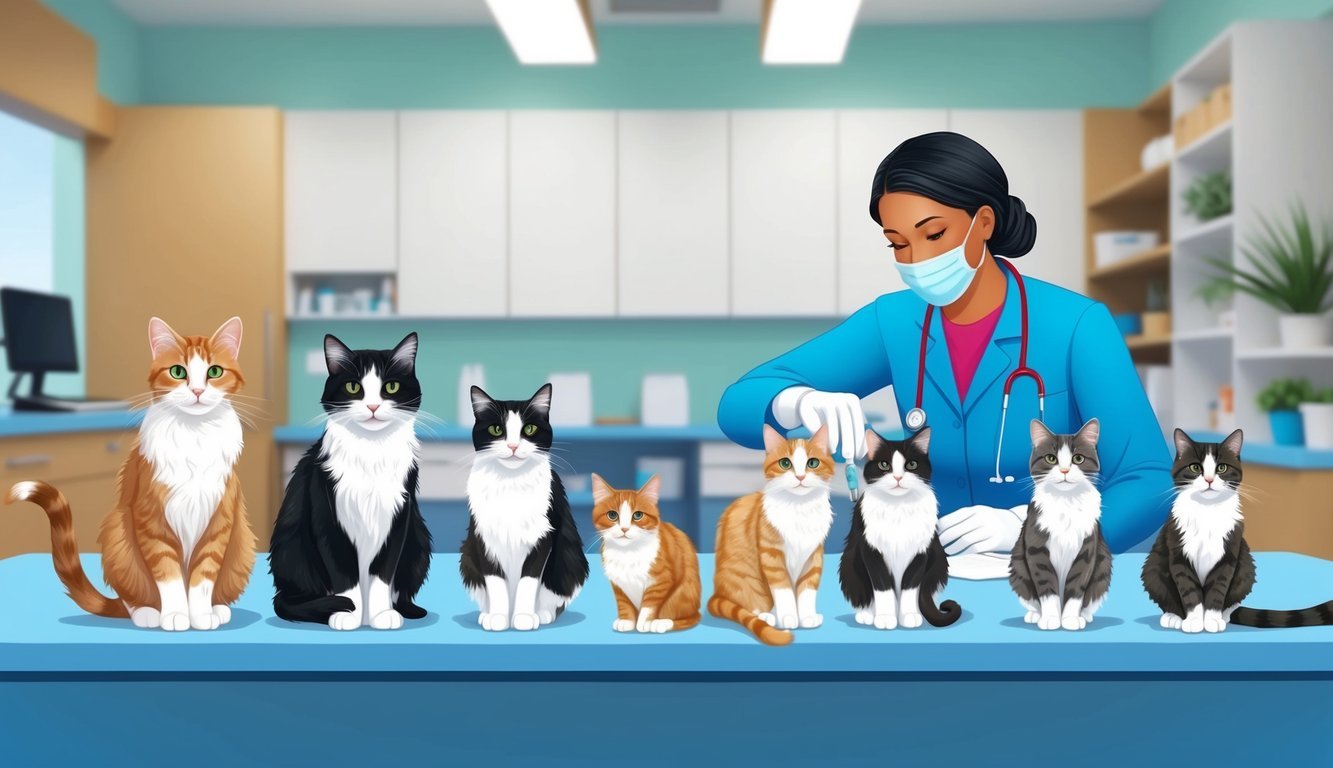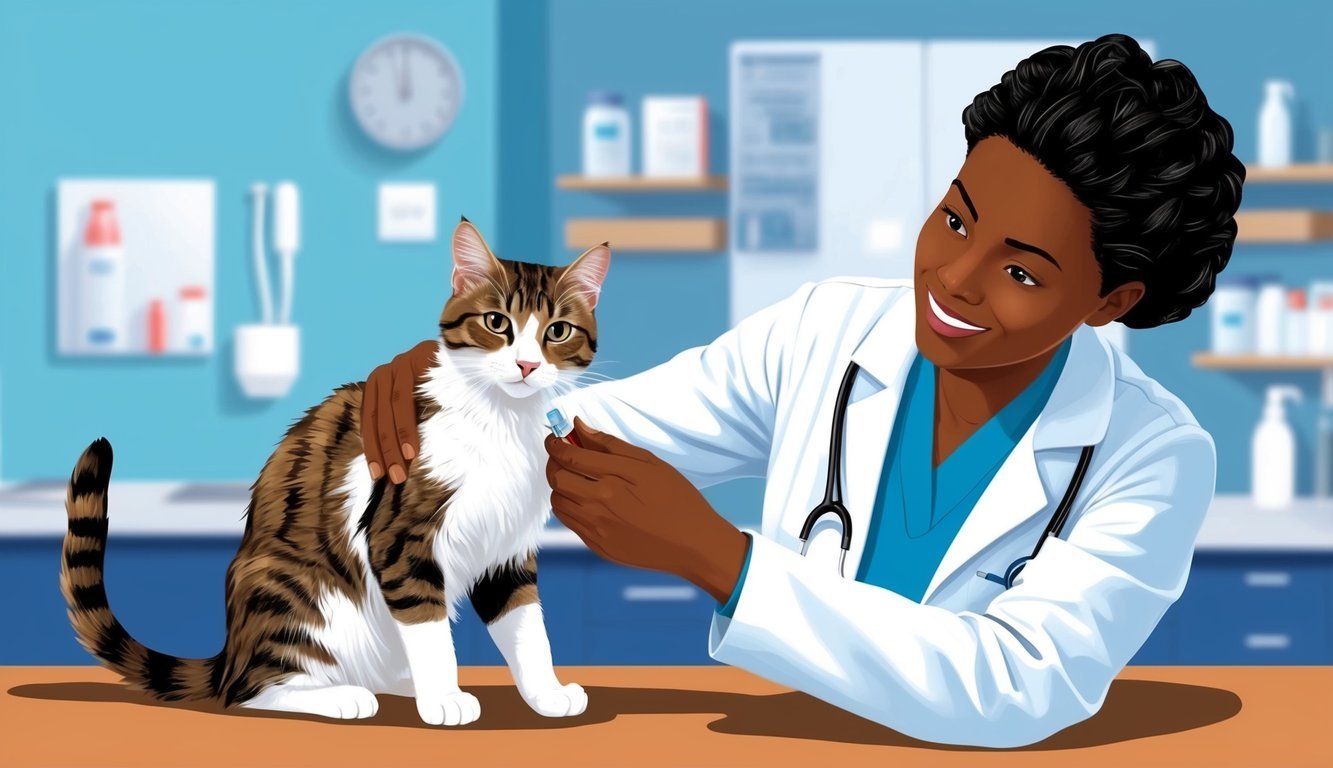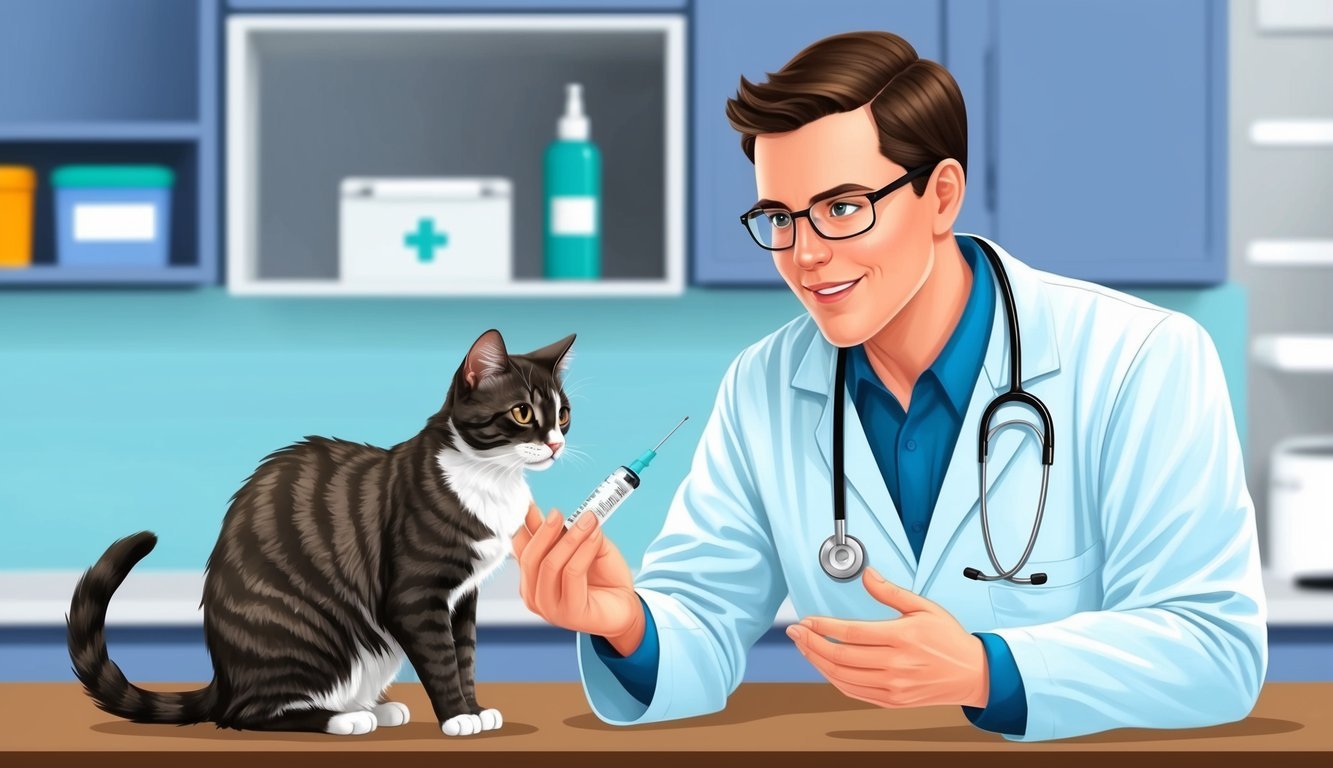Vaccination is a crucial aspect of feline care, especially when it comes to protecting your cat from prevalent viral diseases.
The HCP vaccine covers Feline Rhinotracheitis Virus, Feline Calicivirus, and Feline Panleukopenia.
It is considered a core vaccine that every cat should receive.
As a responsible pet owner, you might wonder when and how to administer these vaccinations and what risks might be involved.
It’s essential to consult with your veterinarian to establish a proper vaccination schedule tailored to your cat’s specific needs.
Maintaining your cat’s health after vaccination also involves monitoring for any side effects or reactions, ensuring a smooth and safe process for your feline friend.
Key Takeaways
- The HCP vaccine protects against major feline diseases.
- A proper vaccination schedule is essential for optimal protection.
- Monitoring your cat post-vaccination is important for their health.
Understanding HCP Vaccines
HCP vaccines are essential for ensuring the health and well-being of your cat.
This section covers what these vaccines are and why they are critical for your feline friend.
What Are HCP Vaccines?
HCP vaccines refer to a combination vaccine that protects against multiple feline diseases.
Specifically, it targets Feline Herpesvirus (FHV-1), Feline Calicivirus (FCV), and Feline Panleukopenia (FPV).
- FHV-1 causes respiratory issues and can lead to severe complications.
- FCV can also affect your cat’s respiratory system, resulting in ulcers and other health issues.
- FPV, often known as feline distemper, is highly contagious and can be fatal.
The Nobivac® Feline 1-HCP vaccine combines these protections into one shot, simplifying the vaccination process.
It’s typically administered to healthy cats at least 9 weeks of age.
The Importance of HCP Vaccines for Cats
Administering HCP vaccines is vital for several reasons.
First, core vaccines, which include HCP, create a strong defense against common and dangerous feline illnesses.
Protection from FHV-1 and FCV reduces the risk of respiratory diseases, while FPV guards against severe gastrointestinal issues.
- For kittens, early vaccination helps establish immunity before exposure to these viruses.
- For adult cats, maintaining up-to-date vaccinations ensures ongoing protection.
Taking preventive steps through vaccination not only keeps your cat healthy but also aids in controlling disease outbreaks in multi-cat environments like shelters or breeding facilities.
Core Vs. Non-Core Vaccines
Vaccination for your cat is essential, but it’s crucial to understand which vaccines are necessary for their health.
Core vaccines provide fundamental protection against widespread and severe diseases, while non-core vaccines are based on specific lifestyle factors.
Here’s a closer look.
Definition and Differences
Core vaccines are recommended for all cats, regardless of their age, breed, or lifestyle.
These vaccines protect against critical diseases, including:
- Rabies: A fatal disease that can affect humans.
- Feline Viral Rhinotracheitis (FHV-1): A common cause of upper respiratory infections.
- Feline Calicivirus (FCV): Another respiratory virus leading to similar symptoms.
- Feline Panleukopenia (FPV): A highly contagious and deadly disease.
- Feline Leukemia Virus (FeLV): Critical for younger cats, especially those under one year.
Non-core vaccines are given based on individual risk assessment.
These include vaccines for diseases less common or only relevant to specific lifestyles.
Factors influencing the need for non-core vaccines may include:
- Outdoor access
- Exposure to other cats
- Regional disease prevalence
Determining Cat Vaccination Needs
To decide on the appropriate vaccines for your cat, consider their individual circumstances.
Start by evaluating the following:
- Age: Kittens typically require a series of core vaccines starting at 4-6 weeks.
- Lifestyle: Cats that go outdoors or visit boarding facilities may need additional non-core vaccines.
- Health Status: Current health conditions might affect vaccination choices.
Consult your veterinarian to develop a tailored vaccination schedule.
They can assess your cat’s environment and exposure risks to recommend essential and optional vaccines.
Regular check-ups are also essential for maintaining vaccination effectiveness and ensuring your cat’s health.
Vaccination Schedule

Understanding the vaccination schedule for your cat is essential to ensure their health and well-being.
This includes the timeline for kitten vaccinations, the schedule for adult cats, and important information about revaccination and boosters.
Kitten Vaccination Timeline
When you bring a kitten home, it’s crucial to start their vaccination schedule early.
The general timeline is as follows:
- 6-8 weeks: Initial vaccines for Feline Herpesvirus (FHV-1), Feline Calicivirus (FCV), and Feline Panleukopenia (FPV).
- 10-12 weeks: Second dose of FHV-1, FCV, and FPV, plus the first FeLV vaccine.
- 16 weeks: Final dose of core vaccines and rabies vaccination.
This early vaccination schedule helps establish immunity against common feline diseases.
A follow-up visit at around 6 months is also recommended, focusing on any necessary boosters, especially if your kitten had maternal antibodies at their last booster.
Adult Cat Vaccination Schedule
For adult cats, the vaccination schedule largely depends on their previous vaccination history and current health status.
Core vaccines for adult cats typically include:
- Rabies: Required annually or every 3 years, based on state regulations and manufacturer recommendations.
- FeLV: Recommended for cats under 1 year and for those at high risk.
It’s vital to keep accurate records of your cat’s vaccinations.
This helps maintain the correct dosage and timing for revaccination.
Regular vet check-ups ensure your cat remains protected and allows for updates to their vaccination status as needed.
Revaccination and Boosters
Revaccination is crucial in maintaining your cat’s immunity.
For most core vaccines, boosters are typically administered:
- Every 1-3 years, depending on the type of vaccine and your cat’s specific needs.
Be aware that some cats may experience mild side effects following vaccination, although such reactions are usually rare.
Discuss any concerns with your veterinarian, who can provide guidance tailored specifically to your cat’s health profile.
Risks and Considerations
When considering vaccinations for your cat, it’s essential to weigh both the benefits and potential downsides.
Understanding vaccine efficacy, safety, and how specific situations affect your cat’s vaccination needs can guide your decisions effectively.
Vaccine Efficacy
Vaccines play a crucial role in preventing serious diseases, but their effectiveness can vary.
Core vaccines, such as those for Feline Viral Rhinotracheitis (FHV-1), Feline Calicivirus (FCV), Feline Panleukopenia Virus (FPV), and rabies, generally provide robust protection.
It’s important to note that the duration of immunity differs among vaccines.
For instance, FHV-1, FCV, and FPV vaccines are usually effective for about three years in most cases.
However, annual or biannual vaccinations may be suggested based on your cat’s lifestyle and risk exposure.
Safety and Side Effects
While vaccines are generally safe, your cat may experience mild side effects.
Common reactions include:
- Tenderness or pain at the injection site
- Mild fever or lethargy
- Loss of appetite for a short period
Serious side effects, though rare, can occur, such as allergic reactions.
Watch for swelling, difficulty breathing, or persistent vomiting.
If any of these arise, seek veterinary care immediately.
Special Cases: Indoor Vs. High-Risk Cats
Your cat’s living environment significantly affects their vaccination needs.
Indoor cats face a lower risk of exposure to infectious diseases, but they still require vaccinations against core diseases.
On the other hand, high-risk cats, such as those that interact with other animals or go outdoors, may need additional vaccines.
For instance, Feline Leukemia Virus (FeLV) vaccines are highly recommended for cats at risk of exposure.
Always consult with your veterinarian to create an appropriate vaccination schedule that addresses your cat’s individual circumstances.
Administering Vaccines
Administering vaccines to your cat is crucial for their health.
You’ll need to focus on proper techniques and care after vaccination to ensure your pet’s well-being.
Proper Vaccine Administration
When administering vaccines, ensure you follow veterinary guidelines.
There are several methods, including subcutaneous (SQ), intramuscular (IM), and intranasal routes.
For most feline vaccines, subcutaneous administration is common, but some may require an intramuscular injection for effectiveness.
Steps for Proper Administration:
- Prepare the vaccine: Ensure it’s the right type, such as inactivated vaccines, and check expiration dates.
- Restrain your cat: Gently but firmly hold your cat to prevent movement during injection.
- Select injection site: Common sites are the scruff of the neck or the thigh, depending on your vet’s guidance.
- Administer the vaccine: Inject at the correct angle and depth, following the vaccine manufacturer’s instructions.
Professional resources from veterinary associations can provide additional guidance on specific vaccines.
Post-Vaccination Care
After vaccination, monitoring your cat for any adverse reactions is essential.
While most cats tolerate vaccines well, some may experience mild side effects.
What to Watch For:
- Common reactions: These can include slight fever, lethargy, or a small lump at the injection site.
- Monitoring behavior: Keep an eye on your cat’s appetite and energy levels for 24-48 hours.
- Emergency signs: If your cat shows severe reactions, such as difficulty breathing or vomiting, contact your veterinarian immediately.
Providing a calm environment and ensuring access to water can help your cat recover.
Proper care after vaccination supports your cat’s immune response and overall health.
Monitoring Health Post-Vaccination

After your cat receives the HCP vaccine, it’s essential to keep an eye on their health.
Monitoring helps ensure their immune system is responding appropriately and can catch any adverse reactions early.
Identifying Adverse Reactions
Some cats may experience reactions following vaccination.
It’s crucial to be aware of common signs such as:
- Lethargy: Your cat may seem more tired than usual.
- Anorexia: A decrease in appetite could indicate discomfort.
- Fever: Elevated body temperature might be a sign of a reaction.
- Local Inflammation: Look for swelling or pain at the injection site.
In rare cases, serious reactions, like injection-site sarcomas, can occur.
These may present as firm lumps or growths.
If you notice any of these symptoms or any unusual behavior, monitor your cat closely.
Documenting the timeline and presentation of symptoms can be beneficial for your veterinarian.
Follow-Up with a Veterinarian
If you notice any concerning symptoms, reach out to your veterinarian promptly.
They can assess your cat and determine if further action is necessary.
During follow-up visits, your vet may:
- Evaluate Symptoms: Discuss any reactions you observed.
- Adjust Vaccination Schedule: Your vet may recommend a different approach for future vaccinations based on your cat’s response.
- Discuss Health History: Share any previous reactions or health issues to tailor a suitable vaccination plan.
Regular communication with your veterinarian is essential.
They can provide valuable insights into your cat’s immune response and overall health and work with you to address any concerns.
Additional Resources
There are various materials available to help you enhance your understanding of HCP vaccines for cats.
These resources cater to both cat owners and veterinary professionals.
Educational Materials for Cat Owners
Your journey to informed pet care can start with educational materials designed for cat owners.
Look for brochures and online resources from reputable veterinary associations, such as the American Animal Hospital Association (AAHA) or the American Association of Feline Practitioners (AAFP).
These often include information about:
- Core vaccines: Understand which vaccines are essential for your cat’s health.
- Vaccination schedules: Learn about the timing and frequency of vaccinations.
- Post-vaccination care: Know what to monitor after your cat receives a vaccine.
Videos and webinars can also provide visual guidance, making the information easier to digest.
Local veterinary clinics may offer workshops or seminars as well.
Professional Development for Veterinarians
For veterinarians, ongoing education is crucial.
Many organizations provide access to advanced training regarding feline vaccination practices.
Consider resources such as:
- Continuing Education courses: Online platforms often offer CE courses focused on vaccinations, including specific HCP vaccine protocols.
- Clinical research articles: Stay updated with recent studies published in veterinary journals.
Participating in community discussions with peers through forums or local veterinary groups can also deepen your knowledge.
These connections often lead to shared insights on best practices in veterinary medicine.
By leveraging these resources, you can significantly enhance your professional expertise related to feline vaccinations.
Frequently Asked Questions

You’ve got questions about the HCP vaccine for your cat.
Let’s address common concerns regarding side effects, vaccination frequency, costs, and more to help you make informed decisions for your feline friend.
What are the side effects of getting my cat the HCP vaccine?
Most cats tolerate the HCP vaccine well, but some might experience mild side effects.
These can include lethargy, decreased appetite, or slight swelling at the injection site.
Serious reactions are rare but can occur.
How often should my cat receive the HCP vaccine?
Typically, the HCP vaccine is given to kittens in a series.
After the initial vaccinations, your veterinarian may recommend a booster every 1 to 3 years, depending on your cat’s lifestyle and health status.
What is the typical cost of the HCP vaccine for cats?
The cost of the HCP vaccine can vary widely based on your location and veterinarian.
Generally, you can expect to pay between $15 to $50 for the vaccine itself.
Additional examination fees might apply.
How does the Feline HCP vaccine differ from the FVRCP vaccine?
The Feline HCP vaccine specifically protects against Feline Panleukopenia, while the FVRCP vaccine covers Feline Viral Rhinotracheitis, Calicivirus, and Panleukopenia.
The FVRCP vaccine is more comprehensive in terms of respiratory and other viral protections.
What is the recommended vaccination schedule for Nobivac Feline 1-HCP?
For Nobivac Feline 1-HCP, the standard schedule starts with vaccinations at 6 to 8 weeks of age.
Boosters are recommended at 10 to 12 weeks and again at 16 weeks.
Annual revaccination is typically suggested thereafter.
Do indoor cats also need to be vaccinated with FIP, or is the HCP sufficient?
Indoor cats benefit from the HCP vaccine for protection against Feline Panleukopenia.
However, it may not be sufficient for other diseases.
FIP vaccination is optional and is often recommended based on specific risk factors.
Make sure to consult your veterinarian about your cat’s individual needs.


